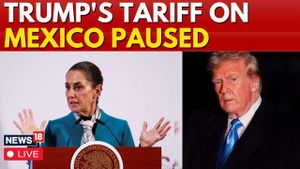Rohit Chopra, the Director of the Consumer Financial Protection Bureau (CFPB), was unexpectedly dismissed by President Donald Trump, ending his term nearly two years prematurely. Chopra, who was appointed by President Joe Biden, received the news of his termination via email from the White House during the transition period following Trump’s inauguration.
Having played a pivotal role in the establishment of the CFPB post the 2008-09 financial crisis, Chopra was seen as both fierce and relentless, particularly against many of the leading financial institutions and tech companies. His leadership focused on consumer protections, especially concerning student loan debt, and advocating reforms within the financial services sector. Chopra stated his appointment under both Biden and Trump was a privilege, and he expressed gratitude to the Senate for confirming his nominations.
Chopra's time at the CFPB saw significant legislation aimed at safeguarding consumers' financial rights. Under his direction, the bureau undertook measures to remove medical debt from credit reports and limit bank overdraft fees, which have drawn substantial backlash from large banking corporations like Bank of America and JPMorgan Chase. These companies, alongside tech leaders, had been reportedly lobbying for Chopra's ouster due to his stringent enforcement policies.
Upon his removal, Trump named Treasury Secretary Scott Bessent as the Acting Director of the CFPB. Bessent, who has positioned himself as closely aligned with Trump’s economic vision, stated his intent to work with the CFPB to lower costs for Americans and advance economic growth. This appointment was welcomed by Republican leaders who have often criticized Chopra's regulatory approach.
Financial services have always been contentious, especially under the CFPB’s purview, which has garnered political debate ever since it was created by the Dodd-Frank Act. Chopra’s termination sparked renewed discussions about the CFPB's future and the growing calls for reform or even its dismantling by various factions within Congress. Some lawmakers seek to place the bureau under stricter oversight, arguing it lacks accountability.
CFPB has always been at the center of financial regulatory debates. Critics argue it has overreached its mandate, damaging the financial markets. Following Chopra's firing, Republican representative French Hill articulated his support for reassessing the bureau’s independence, emphasizing the need for the CFPB to be more accountable to Congress.
Chopra's departure highlights the frictions between regulatory bodies and the financial entities they oversee. His tenure was perceived as particularly damaging to Wall Street, which incurred penalties and penalties related to consumer practices. Critics have suggested his rigorous enforcement is synonymous with government overreach, leading to increased operational costs for financial service firms.
His immediate successor, Bessent, has taken action to freeze any forthcoming regulations and investigations, which signals Trump's administration may look to overturn many popular reforms initiated during Chopra's leadership. According to early reports, Bessent instructed CFPB staff to cease regulatory activities and become more aligned with the administration's economic priorities, restricting communications and planning during this transition.
Chopra addressed his termination with resilience, stating, “Serving as Director of the Consumer Financial Protection Bureau has been extraordinary,” underscoring his commitment to consumer welfare. Over his tenure, Chopra amplified consumer rights and financial inclusivity, which now may come under threat with the incoming leadership.
Chopra’s policies, like the limit on overdraft fees, are projected to save consumers billions annually, and are likely to be reconsidered or rolled back under the new administration. His initiatives also included examining credit card interest rates, aiming to enforce transparency and curb exorbitant financial practices, which aligned closely with Trump's prior campaign promises.
Trump’s administration, equipped with Republican majorities in both chambers of Congress, has the capability to utilize the Congressional Review Act to repeal some of the CFPB's finalized rules, which could drastically reshape the financial governance framework. Such legislative moves are anticipated merely as the administration aims to rewrite consumer protection dynamics fundamentally.
The CFPB's operational future might become precarious, especially as Congress emphasizes re-evaluations of its funding mechanisms. Past discussions surrounding the agency's funding indicate potential legislative threats, which lead some to speculate whether future CFPB operations may resemble those under earlier Trump appointees who pursued different regulatory philosophies.
Chopra's accomplishments, particularly his initiatives aimed at reducing medical debt vulnerabilities, highlight the agency’s role as the defender of consumer rights—benefits millions of Americans rely upon. His abrupt departure is emblematic of the changing political tides within federal regulations, which are dictated by administration priorities and congressionally driven agendas.
Whether the CFPB will maintain its consumer-focused agenda during this transition remains uncertain. Analysts now watch closely as Scott Bessent begins to navigate the complex regulatory terrain left by Chopra’s proactive leadership, pondering what restrictions will emerge next and how consumer protections will evolve amid changing political goals.



